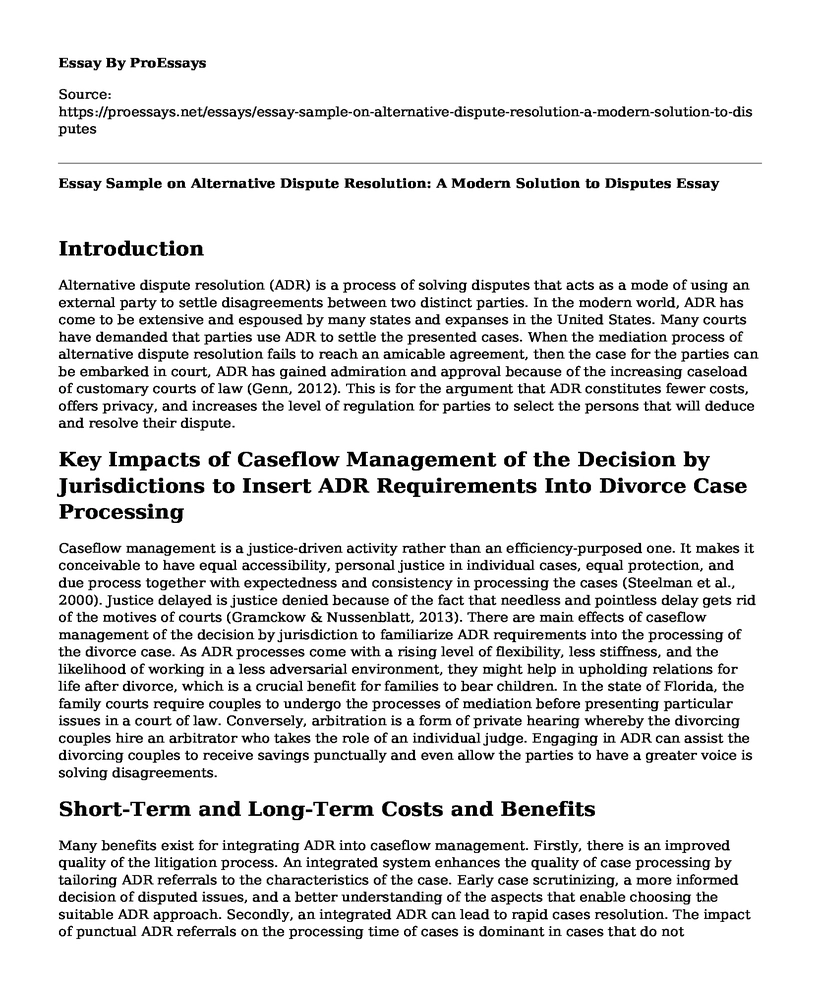Introduction
Alternative dispute resolution (ADR) is a process of solving disputes that acts as a mode of using an external party to settle disagreements between two distinct parties. In the modern world, ADR has come to be extensive and espoused by many states and expanses in the United States. Many courts have demanded that parties use ADR to settle the presented cases. When the mediation process of alternative dispute resolution fails to reach an amicable agreement, then the case for the parties can be embarked in court, ADR has gained admiration and approval because of the increasing caseload of customary courts of law (Genn, 2012). This is for the argument that ADR constitutes fewer costs, offers privacy, and increases the level of regulation for parties to select the persons that will deduce and resolve their dispute.
Key Impacts of Caseflow Management of the Decision by Jurisdictions to Insert ADR Requirements Into Divorce Case Processing
Caseflow management is a justice-driven activity rather than an efficiency-purposed one. It makes it conceivable to have equal accessibility, personal justice in individual cases, equal protection, and due process together with expectedness and consistency in processing the cases (Steelman et al., 2000). Justice delayed is justice denied because of the fact that needless and pointless delay gets rid of the motives of courts (Gramckow & Nussenblatt, 2013). There are main effects of caseflow management of the decision by jurisdiction to familiarize ADR requirements into the processing of the divorce case. As ADR processes come with a rising level of flexibility, less stiffness, and the likelihood of working in a less adversarial environment, they might help in upholding relations for life after divorce, which is a crucial benefit for families to bear children. In the state of Florida, the family courts require couples to undergo the processes of mediation before presenting particular issues in a court of law. Conversely, arbitration is a form of private hearing whereby the divorcing couples hire an arbitrator who takes the role of an individual judge. Engaging in ADR can assist the divorcing couples to receive savings punctually and even allow the parties to have a greater voice is solving disagreements.
Short-Term and Long-Term Costs and Benefits
Many benefits exist for integrating ADR into caseflow management. Firstly, there is an improved quality of the litigation process. An integrated system enhances the quality of case processing by tailoring ADR referrals to the characteristics of the case. Early case scrutinizing, a more informed decision of disputed issues, and a better understanding of the aspects that enable choosing the suitable ADR approach. Secondly, an integrated ADR can lead to rapid cases resolution. The impact of punctual ADR referrals on the processing time of cases is dominant in cases that do not necessitate a trial. Thirdly, an integrated ADR system can result in better use of court resources. Early scrutinizing recognizes cases that necessitate significant judicial engagement and more preparation time. Finally, an integrated ADR system improves litigation satisfaction (Gramckow & Nussenblatt, 2013). Combining the ADR processes into civil caseflow administration increases the probability that the issues in a legal dispute will be addressed in a suitable fashion and that this will occur quicker and at less expense in the traditional litigation process.
Types of ADR Processes and Their Effect on Caseflow Management
In Florida State, Alternative dispute resolution (ADR) had been used to solve disputes after the creation of the first citizen dispute settlement center in Dade County. Mediation and arbitration are the forms of alternative dispute resolution that are required in the state. Under Florida law, mediation implies a process where a neutral individual acts to encourage and enable the resolution of a disagreement among at least two parties. Arbitration implies a process where a neutral individual takes into account the facts and agreements presented by the parties and makes a decision. It is legally binding on both parties when a court affirms this decision (Blattmachr, 2010). The ADR processes affect the caseflow management because it dictates the results of the disputes and litigants' insights into the case.
References
Blattmachr, J. G. (2010). Reducing Estate and Trust Litigation Through Disclosure, In Terrorem Clauses, Mediation and Arbitration. ACTEC LJ, 36, 547.
Genn, H. (2012). What is Civil Justice For-Reform, ADR, and Access to Justice. Yale JL & Human., 24, 397.
Gramckow, H. P., & Nussenblatt, V. (2013). Case Flow Management: Key Principles and the Systems to Support Them.
Steelman, D. C., Goerdt, J., & McMillan, J. E. (2000). Caseflow management: The heart of court management in the new millennium (pp. 137-43). Williamsburg, VA: National Center for State Courts.
Cite this page
Essay Sample on Alternative Dispute Resolution: A Modern Solution to Disputes. (2023, Mar 26). Retrieved from https://proessays.net/essays/essay-sample-on-alternative-dispute-resolution-a-modern-solution-to-disputes
If you are the original author of this essay and no longer wish to have it published on the ProEssays website, please click below to request its removal:
- Hirschman's Theory of Exit, Voice, and Loyalty Versus Hoffer's Analysis of "True Believers"
- Ethical Principle Application Paper Example
- Essay Sample on Corporate Cultures
- Paper Example on Creative Leadership: Understanding & Practicing Diversity
- Essay on President Shepherd's Inspiring Speech: An Example of Character and Leadership
- Value-Based Leadership: a Necessity for Success - Essay Sample
- Free Essay Sample on Head Nurse: A Leadership Role in Healthcare







